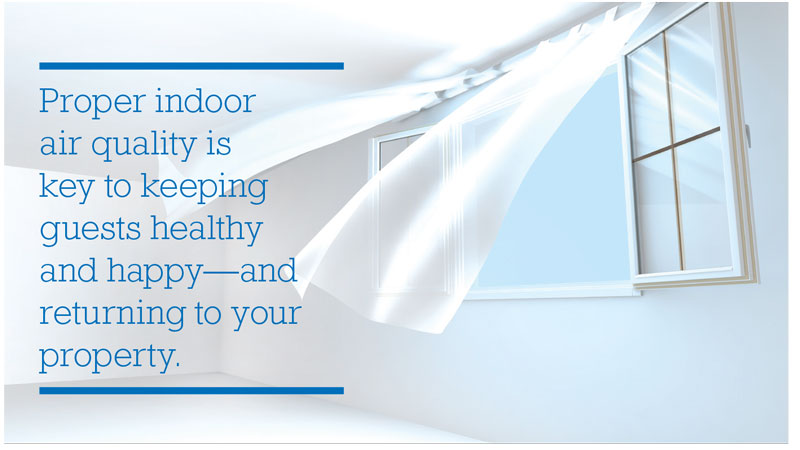TORRANCE, CA—Whether it’s the right lighting, carefully curated music, or a signature scent, hotels are keenly focused on creating the ideal environment for a guest’s comfort and relaxation during the stay. Indoor air quality (IAQ) is just as important.
Studies of human exposure to air pollutants indicate that indoor levels of pollutants may be two to five times—and, occasionally, more than 100 times—higher than outdoor levels, according to the U.S. Environmental Protection Agency (EPA). Since most people spend about 90% of their time indoors, these levels of indoor air pollutants are of particular concern.
“Issues with IAQ in hotels can lead to complaints relating to facility cleanliness, occupant discomfort and even sickness,” said Benjamin Jelin, a project manager for industrial hygiene and environmental consulting at Partner Engineering and Science Inc. “Customers in hotel settings usually spend a significant portion of their stay either sleeping, otherwise occupying their rooms or using hotel facilities.”
It’s about more than breathing easy. The EPA noted that, in rarer cases, there’s the potential for life-threatening conditions such as Legionnaires’ disease or carbon-monoxide poisoning.
“Hotel employees can also be affected by IAQ issues leading to decreased productivity and even lost days at work,” said Jelin. “In extreme cases, this could even lead to disability and premature death. Unmitigated IAQ issues can lead to civil, regulatory and criminal liability under the right circumstances. Providing exceptional IAQ for occupants and employees is not only a health concern, it’s a legal and business liability concern.”
In a hotel setting, perception is reality, and hotels must manage that perception from when the customer checks in until they check out, urged Jelin.
“Even minor issues with IAQ can negatively affect customer perception, which may damage a company’s brand and lead to poor customer retention,” he said.
In business for 11 years, Partner Engineering and Science Inc. focuses on providing core engineering, environmental and energy commercial real estate consulting services. The company’s industrial hygiene team assists clients in the control of environmental and occupational stressors from the workplace, which may cause impaired health and well-being, or significant discomfort among workers or among citizens of the community.
 So, what causes a disruption in indoor air quality in hotels? Well, the factors that negatively impact IAQ are wide-ranging and include the following:
So, what causes a disruption in indoor air quality in hotels? Well, the factors that negatively impact IAQ are wide-ranging and include the following:
• Poor housekeeping and maintenance, which can lead to an increase in aerosolized dust and debris
• Use of cleaning products that have constituents that are likely to cause occupant or worker irritation or allergy
• Use of active deodorizers that are likely to cause occupant or worker irritation or allergy
• Unbalanced or poorly operating heating ventilation and air conditioning (HVAC) systems that don’t provide the appropriate heating, cooling and humidity control, as well as fresh air introduction into an occupied space
• Improper lighting and illumination of occupied rooms, which can lead to the perception of poor IAQ
• Unmitigated moisture intrusion from failures in the building envelope, plumbing or HVAC balance, which can lead to visible microbial growth (mold or fungus, for example)
• Renovation of building spaces where hazardous materials are present, such as asbestos fibers, respirable crystalline silica, lead (Pb), polychlorinated biphenyls (PCBs), etc., without proper engineering and worker protection controls in place
• Introduction of manufactured textiles and furniture that off-gas hazardous substances or irritants (such as formaldehyde)
• Introduction of pollutants from the outdoor space through fresh-air intakes for buildings including, but not limited to, auto exhaust and secondhand tobacco smoke
• Improper maintenance and disinfection of plumbing systems leading to inappropriate amplification of Legionella bacteria, which can cause Legionnaires’ disease
“Guests who experience poor indoor air quality during their stay at hospitality properties may choose not to return, leave negative feedback or a poor online review at influential travel sites, or even ask for a refund for their stay,” he said. “In extreme cases, these properties may be held liable for any health effects incurred because of exposure to poor air quality, volatile contaminants or biological hazards.”
Where there’s smoke, there are going to be complaints. Odors and temperature are also key concerns for guests.
“Guests are often bothered by the smell of tobacco smoke—either direct or secondhand—or stale odors from rooms where smoking had been allowed. Guests may also complain about odors from housekeeping cleaning agents, water damage or moisture (moldy smells), or lingering odors in furniture and carpets,” he said. “Of all formally lodged complaints to hotels, roughly a quarter of guests also feel their room is either too hot or too cold, with improper thermal temperature control measures in their room.”
Several members of Partner Engineering and Science’s industrial hygiene team consulted on a hotel building in Massachusetts that was undergoing extensive renovations. During the early phase, the presence of mold was discovered, along with poor IAQ. Jelin highlighted how his company assisted with the issues:
“Moisture mapping identified water damage behind vinyl wallcoverings in nearly all the rooms of the hotel. This was causing a mildew odor, and there was visible growth on walls and, in some cases, carpeting and other surfaces,” he said. “After much investigation, the team identified the source of the problem as the packaged terminal air conditioning (PTAC) units within each room. The PTAC units had many maintenance issues, including lack of cleanliness, drain pans being pitched toward the rooms causing water to enter rooms, many of the small drain lines of the primary drain line system clogging, and other violations. Many of the PTAC units toward the end of their service life weren’t able to maintain relative humidity below 60%.
“The industrial hygiene team collaborated with a restoration contractor to remove vinyl wallcoverings from all rooms and hallways and, subsequently, remove and treat microbial growth. The teams worked with an HVAC contractor to clean and perform maintenance on the PTACs in each of the rooms,” he said. “The IAQ was sufficiently improved to resume building renovations.”
An ounce of prevention is worth a pound of cure. To help clear the air, Jelin recommends taking action according to industry standards and guidelines; conduct routine HVAC and plumbing maintenance; develop and maintain a Legionella management program, as well as moisture and mold operations and maintenance; and reduce or limit smoking in the hotel facility to prevent introduction of secondhand smoke.
“Our goal is to keep people healthy and safe. Partner industrial hygienists, consisting of industry leading technical experts, scientists and engineers, play a vital role in ensuring that federal, state and local laws and regulations are followed, as well as providing recommendations for best practices,” he said. HB

